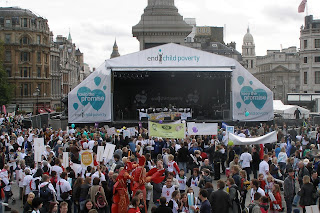
Last Saturday, I went on the end child poverty campaign march, which ended with a rally in Trafalgar square http://news.bbc.co.uk/1/hi/uk/7651606.stm It was an affable and lively affair. The most obvious contingents were from anti-poverty and children’s charities, such as Barnardos, Action for Children, CPAG etc. Clearly, the aim was to make this a family friendly fun day out rather than a dour demonstration; so the participants included people dressed up as giant lobsters and much other silliness, all of which worked well. The rally was hosted by a famous person who I’m afraid I’d never heard of http://en.wikipedia.org/wiki/Christopher_Parker and in another sign of my old age, where I had expected to see a large number of Labour Party branch banners; I did not see a single one. There were some small trade’s union groupings from teachers and public sector unions.
In the square, large screens carried short broadcasts describing the reality of poverty in the UK and these were interspersed with some campaign posters. Some of these made me wonder. In particular, two poster/adverts worried me: the first, simply asserted ‘we spend £10 billion pounds a year on wine and champagne in this country’. The second, that we spend £24 billion (I think it was 24) on foreign holidays. I’m sure the intention of these statements is to plant the thought that if we can collectively spend such large sums of money on obviously gratuitous expenditure then we can easily afford to end child poverty. I think this line of argument is a real mistake: to be blunt, if ordinary folk think they are going to loose their annual holiday in order to pay for someone who has produced children without the proper means to support them then this movement is dead in the water. We must emphasise that we can afford this without ordinary people making sacrifices.
The march organisers were very pleased that the Prime Minister had once again committed the government to meeting the aim of abolishing child poverty by 2020; although the form of his commitment surprised me. The prime-minister announced that there will be "ground-breaking legislation to enshrine in the law of the land Labour's pledge to end child poverty"
This announcement was generally met by words of uncritical welcome http://www.guardian.co.uk/commentisfree/2008/sep/26/children.gordonbrown I know that ministers think the electorates’ memory is short but am I the only person in the charity business to remember that the government enshrined in law their commitment not to introduce university top up fees. Indeed, I’m enough of train spotter to still have a copy of the 2001 election manifesto which included the pledge, that the government "will not introduce top-up fees and has legislated against them". They were elected and they changed the law soon after and introduced top-up fees. So, I guess Gordon’s people judge that the collective social memory is around 5 years and as this commitment is 12 years away….
Maybe we all like magical thinking; it’s nice to think that poverty could be abolished. All the main political parties say they agree with the aim, there is no opposition, and yet, I don’t feel there is a hope in hells chance of achieving it. For example, the recent report showing that the number of people in the UK who are in fuel poverty rose by a million in 2006 – what must those numbers be now http://news.bbc.co.uk/1/hi/uk/7647997.stm
Equally, I think the campaign organisers are right to try to hold government and other political parties to their public commitment to end poverty. However, in order to avoid disappointment, I’d caution people to remember that in this world the tail never gets to wag the dog.
Please left click on the picture to spot the lobsters